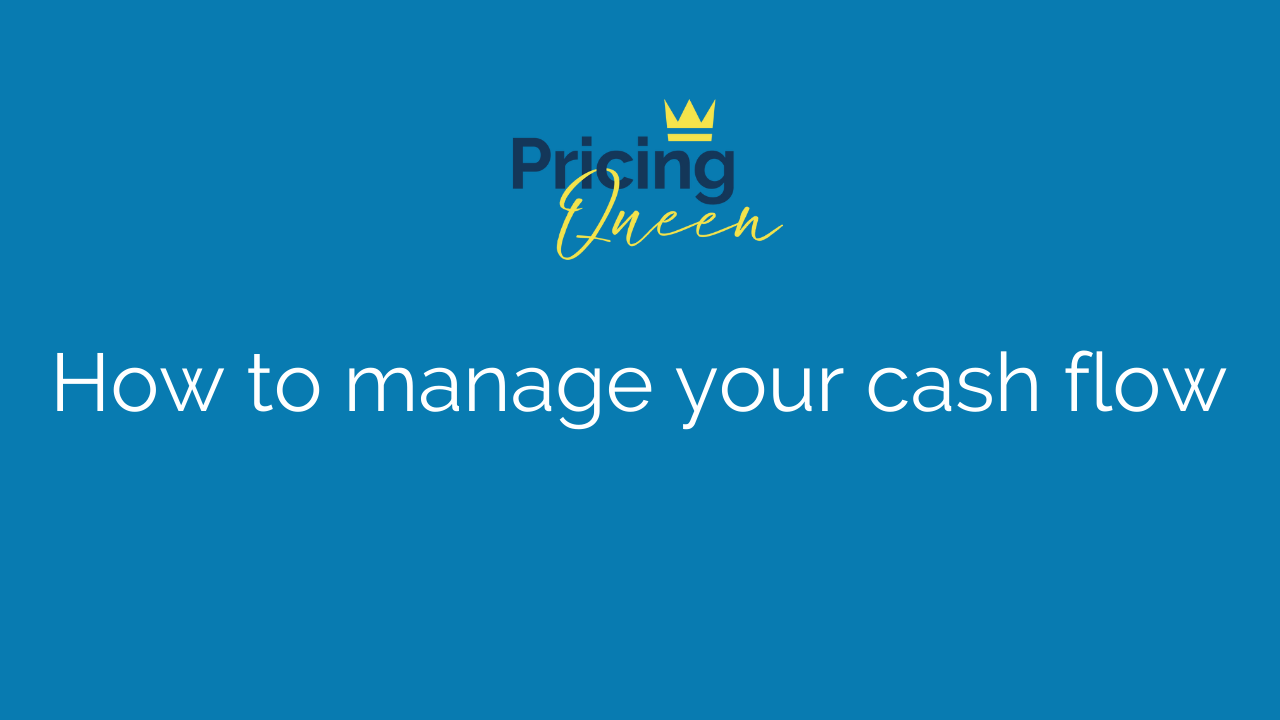How to manage your cash flow

Do the words cash flow management bring you out in hives? Do you struggle to understand how cash flow and pricing are linked? Do you understand how critical cash flow is to your business? Cash flow is an essential aspect of your business, and you need to understand it. But if it currently makes your head spin, you’re not alone!
So if you’re looking to better understand and manage it, keep reading, as this blog post is just what you need.
What is cash flow?
Cash flow management is basically what's coming in your business and what's going out of it. It also covers what's gone out of your business and what’s coming up and due to go out of your business. Because it’s essential to know what payments you have coming up so that you know if you've got enough cash to last you.
There's a saying: ‘Revenue is vanity, profit is sanity, but cash is king’. It’s a good one to remember because, ultimately, if you don’t have cash in your business, you don’t have a business. What matters is how many bills you’re putting out there and invoicing to clients and ensuring they’re paying you. Because if you’re not getting paid, you haven't got a business, and you don't have the cash to pay your own staff.
Cash flow is made up of four main things - customer payments and money coming in, supplier payments and money you’re paying out, tax and VAT, and paying yourself.
#1: Customer payments
You need to have a really good process in place for making sure you don't get stuck with money that's not coming into your business. So if you are a service business, you should have things on either 7 or 14-day terms. Make sure you're getting paid promptly, and you bill quickly. You need to be chasing that money up, so you don’t have bad debts on your books.
The other thing to do is bill in advance. Always look to bill at least 50% in advance so that you're not out of pocket. Also, understand how long it takes to get paid so that you can chase things up quicker in the future. Otherwise, you can get stuck with lots of things going out when you haven't got any money coming in the door.
#2: Supplier payments
Supplier payments are those bills you need to pay for people that have done work for you, software or supplies. Many things come out by credit card or direct debit, with many things taken automatically, so you need to make sure you've got enough cash to deal with that.
And you need to make sure you're not paying them too quickly. There’s an argument that if you're dealing with freelancers, you might want to pay quickly, but I don't think you should pay people before their payment date, particularly if cash flow is tight in your business. Pay people to their terms and don't pay people in advance. You need to hang onto your cash for as long as possible.
#3: Tax
Next up is tax. You need to think about what other calls there are on your cash. Yes, there are calls on your money now and things you've got to pay the next week or the next month, but also, you're going to have to pay tax in the next 9-18 months. So put that money somewhere else in your business. If you've got a bank like Starling, use their spaces. If you've just got a regular bank account, set up another account so you can put that money away.
Every month put money aside for your tax. You want to build this up, so you don't get a surprise and suddenly find you can't afford to pay a tax bill and have to put something on a credit card. That's particularly true if you are VAT registered, too, because you'll need to hang on to that. You might want to think about paying for things like VAT monthly if you're paying it to the HMRC. And you might want to do that with lots of supplier payments, even though it's slightly cheaper to pay things annually - so that you know where you’re at.
#4: Paying yourself
And finally, what are you doing about paying yourself? This should be one of the first things you think about. It’s about making sure you’re paying yourself and leaving enough cash in the business to do that. Remember that if you don’t prioritise the cash flow for your business so it can grow, it’s just an expensive hobby - especially if you’re not paying yourself.
So think about the flow of your business and the seasonality of it. For example, does all your revenue come in in great big chunks? Do you run a huge group coaching programme, and all your money comes in in one month? Does that last you the three months you need it to, or is that gone within a minute? Take a good look at the flow of money into your business and manage those things that take your cash away from you.
You don’t need to be scared of managing your cash and understanding your cash flow. Just remember the four parts mentioned above. Then it's just keeping a close eye on your bank account, looking at what's happening now and what's going to happen in the future and setting aside money to cover it all.
